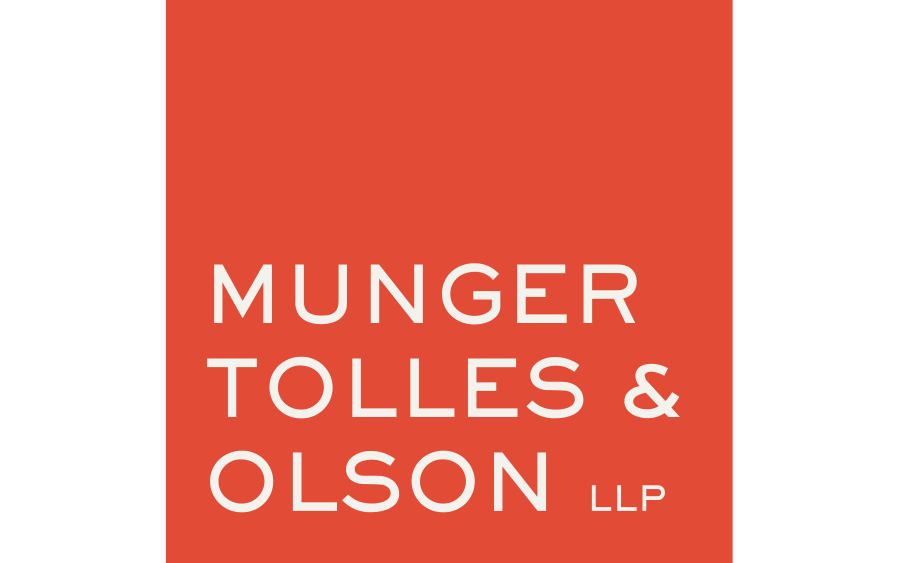Alumni Network Newsletter – Fall 2023
Table of Contents
- Welcome from Malcolm Heinicke and Hailyn Chen
- Alumni Spotlight
- Catching Up With MTO’s Alumni Federal Judges
- MTO Alumni CLE Series
- Alumnus Speaker Lunch Series
- Case Spotlights
- Deal Spotlight: Everything’s Coming Up Roses…and more
Welcome from Malcolm Heinicke and Hailyn Chen
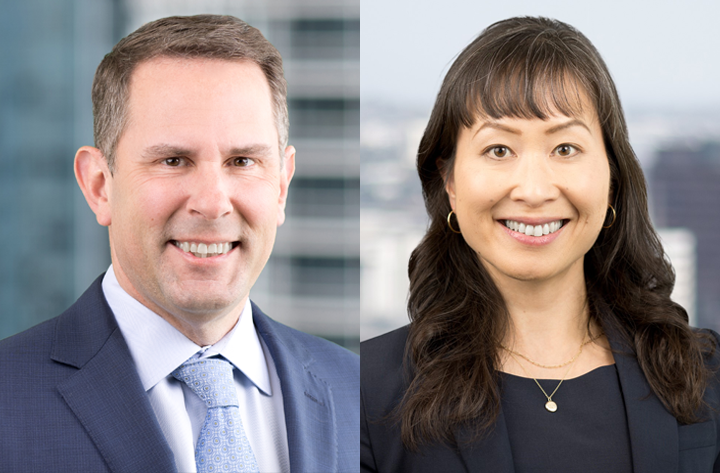 |
| Malcolm Heinicke & Hailyn Chen |
Welcome to the second edition of the MTO Alumni Network Newsletter! We have heard from many of you, and we are delighted to bring you more of what you loved about our inaugural edition.
As you’ll read below, it has been an exciting time for many MTO alumni. We have initiated a very well-received program to invite former MTO lawyers to come speak at our firmwide lunches — and now our other alumni will be welcome to attend these sessions virtually. Our former Los Angeles colleague Michael Waterstone has become the new dean of UCLA Law School. And our former San Francisco colleague Alison Markovitz started a new position as COO of the Carnegie Endowment for International Peace. Meanwhile, several MTO current lawyers and alums had the pleasure of attending the investiture of our very own Gabe Sanchez as a Ninth Circuit judge, joining four other alumni currently on that court and two federal district court judges on either side of the country. Our newsletter had the chance to catch up with all of these alumni, and we’re sure you’ll join us in the pride we feel about their post-MTO accomplishments.
At the same time, we are excited to share a summary of accolades that highlight and reinforce the success of our firm.
Just in case you missed it, we are thrilled to repeat that this year MTO was ranked No.1 in The American Lawyer’s A-List for the ninth time. The A-List evaluates firm performance across five key categories, including revenue per lawyer, associate satisfaction, diversity, pro bono commitment and the percentage of women equity partners. MTO has earned the highest average A-List rankings in the listing’s 20-year history and the most No. 1 rankings in the history of the award. As we have said before, we are particularly proud of this award as it reflects both the financial and cultural success of the firm.
As a reflection of our ongoing commitment to pro bono work, MTO was ranked No. 1 for average pro bono hours and No. 2 overall in The American Lawyer’s 2023 Pro Bono Scorecard. Our lawyers averaged 203.8 hours of pro bono work in 2022, the most for any firm.
For the third consecutive year, the firm was named to the Los Angeles Business Journal’s Most Admired Law Firms to Work For List, which recognizes law firms that are consciously working toward creating diverse, positive and supportive environments to help drive the success of their lawyers and professionals. While we recognize that there is always more work to do in this critical area, we are proud of our accomplishments to date, and so this recognition is especially gratifying.
While some may not often see the words “appellate” and “hot” in the same accolade, we are thrilled to put them together here when noting that MTO was named to the National Law Journal’s 2023 Appellate Hot List, an annual list that honors law firms engaging in exemplary appellate advocacy on behalf of their clients. This is the fourth time the firm has been recognized as a winner on the Appellate Hot List in the past six years, which should qualify us as sizzling hot.
Also this year, our technology practice was named a Tech Industry Litigation Department of the Year finalist by The Recorder for the second year in a row. The award is part of the California Legal Awards, which celebrate the achievements of lawyers and companies leading technology, innovation and the legal profession as a whole. We are thrilled to have been recognized in this competitive field once again.
The firm’s Los Angeles Mergers & Acquisitions practice was recognized in the 2023 IFLR1000 Guide, an annual list of the world’s leading financial and corporate law firms and lawyers published by the International Financial Law Review. This award does not use temperature descriptions, but we still think this is very, well, cool.
MTO also received top rankings in the 2024 Vault Guide, an annual workplace survey of associates, including a No. 1 ranking in the Best Law Firms for Integration of Laterals and Clerks list. The firm was ranked amongst the top firms nationally in several other areas, including the Best Law Firms for Selectivity list, the Best Summer Associate Programs for Social Experiences list, and the Best Law Firms for Transparency list. In its “Vault Verdict,” the publication noted that “Munger Tolles may be small by BigLaw standards, but it would be a mistake to judge the firm by its size.”
And finally, as part of a campaign near and dear to so many of us, the firm was once again named the top Food From The Bar fundraiser in the 2023 Los Angeles and San Francisco campaigns. This marked the sixth consecutive year that MTO’s LA office has received the Overall Award for accumulating the most points from monetary donations during the campaign. In total, the 2023 Los Angeles Food From The Bar campaign raised $548,983 for the Los Angeles Regional Food Bank, which exceeded the already ambitious $540,000 goal. In San Francisco, Food From The Bar campaign raised a total of $453,546 for the San Francisco-Marin Food Bank. This was the seventh time the San Francisco MTO office was named the top fundraiser. And, taking this effort bicoastal, a total of $545,489 was raised for the Capital Area Food Bank by our Washington, D.C. office and the other law firms and legal associations that worked together on this effort in Washington.
We are thankful to everyone as we continue the dedication and commitment to excellence that started when you were here and continues with our current MTO family.
All the best,
Malcolm Heinicke and Hailyn Chen
MTO Co-Managing Partners
Alumni Spotlight
.png) |
|
| Alison Markovitz | |
Alison Markovitz is the chief operating officer at the Carnegie Endowment for International Peace. She was an associate in the San Francisco office from 2003 to 2009 before leaving the firm to work in the Executive Office of the President in the Obama White House. Later she served in leadership roles at the Department of Energy and at Fermilab. We had the chance to learn more about Alison’s successive roles and how they inform her current work.
Congratulations on completing your first year as the COO of the Carnegie Endowment. What are your responsibilities in this position?
Thank you. It has been a busy first year! As COO I’m generally responsible for overseeing the operations at the Carnegie Endowment. This includes our human resources and administration, finance, and information technology departments, as well as our annual budget process and management of our endowment, which is over $400 million. I also serve as Carnegie’s corporate secretary, and in this role I work closely with our terrific board of trustees. In addition, I work closely with Carnegie’s president as part of our executive management team to develop policies and strategy for Carnegie as a whole.
One thing that is special about Carnegie is that it is a uniquely global think tank. In addition to our headquarters in Washington, D.C., our network includes several overseas centers —Carnegie Europe, Carnegie Russia Eurasia, Carnegie Middle East, Carnegie China and Carnegie India. Our centers help ensure that Carnegie’s research and policy recommendations are not just U.S.-based. Rather we make sure to consider the perspectives and insights of those living and working in a given region. As COO I work closely with our centers to support their operations — with rules, policies and challenges varying from country to country.
This past year I spent a good deal of time establishing our Carnegie Center in Berlin, which is called the Carnegie Russia Eurasia Center. This center was actually established as a result of the Ukraine war. When Carnegie’s long-standing Moscow center was shut down by the Russian government in April of 2022, many of our scholars left the country. In response, we created Carnegie’s new Berlin center as a home for these scholars and their work, which has been critical in providing independent insight into Russia and the Ukraine war. My colleagues and I worked closely with German counsel to set up the new center and facilitate the immigration of our scholars to Germany.
What do you hope to accomplish in this position?
A key objective for me is to ensure that Carnegie is a safe and welcoming place to work. I started shortly before we returned to the office in D.C. following COVID restrictions and a renovation of our building. This past year has been an opportunity to establish a new normal, and to reconnect and strengthen relationships. Our scholars are the world’s experts in their fields, and we seek to create an environment where they can effectively work together to provide insightful analysis to policymakers and other critical decision-makers addressing some of the toughest global challenges. I also work to ensure we remain on solid financial footing and grow our endowment.
Before Carnegie, you held leadership positions at a U.S. National Laboratory, the DOE and the White House. Remind us of the positions you held and how they prepared you for your current role in Washington, D.C.?
I’ve been fortunate to hold a number of different positions with wonderful colleagues. After I left MTO I joined the Obama White House and focused on vetting presidential appointees, including Cabinet secretaries and other senior positions. I then moved to the Department of Energy where I served in a few roles, including as a senior advisor to the Secretary of Energy and director of the Laboratory Operations Board.
Most recently I worked at Fermilab, which is America’s particle physics and accelerator laboratory. At Fermilab my role included leading a board comprised of international funding agencies supporting DUNE, a $3 billion project to discover the mysteries of neutrinos. I also ran the lab’s Requirements Oversight Board, which developed a new system to manage policies, and was part of the core team responsible for winding down and then restarting the lab’s operations during COVID.
While each of these jobs was substantively different, they all helped teach me how to build teams and collaborate effectively across departments to accomplish shared objectives. At the Department of Energy, when I was asked to launch the Laboratory Operations Board, I spoke to colleagues about where we could make the biggest impact. What I heard most frequently was that the labs’ core infrastructure, largely built at the beginning of the Cold War, was aging and required a big investment to ensure it could continue to support cutting-edge science. I pulled together experts across the lab system to overhaul and standardize the way that the department assessed and managed its infrastructure. We were able to demonstrate the effectiveness of our new approach and received hundreds of millions of dollars in additional appropriations. This experience helped underscore for me the importance of identifying good ideas and gaining buy-in to advance them across a workplace in a more systematic way.
Did your work at MTO prepare you for your work at Carnegie? How so?
Yes, many of the skills I developed at MTO are directly applicable to my current work. One important thing I learned at MTO is creative problem-solving. Our cases always presented novel legal issues that did not fit into a clear precedent. I learned how to assess the existing legal landscape, get a firm handle on the relevant facts, and make persuasive arguments on behalf of our clients.
Now my colleagues will come to me when they have issues that they’re not sure how to resolve. Given the shifting landscape of some of the regions in which we operate, the challenges are always new. I appreciate everything I learned at MTO in terms of how to gather the information I need and develop creative solutions — sometimes with short deadlines!
In addition, the confidence I gained taking the lead and building teams as a young litigator has helped me step into unfamiliar situations at each new phase of my career. I learned the importance of asking many questions and relying on experts — from the wonderful paralegals at MTO, to my more senior colleagues, to our clients — to get a grounding in the facts and put together a strategy to advance our case. Among my favorite parts of each of my jobs has been learning from my colleagues, including the brilliant physicists at Fermilab and the inspiring scholars at Carnegie, and creating structures to advance their work.
Interview of Dean Michael Waterstone
.png) |
| Michael Waterstone |
We recently spoke with Michael Waterstone, the newly appointed dean of the UCLA Law School. Michael was an associate at the firm from 2000 to 2003. He left to take a teaching position at the University of Mississippi School of Law, then taught for a decade at Loyola Law School, where he also served as associate dean from 2009 to 2014. After a year teaching at Northwestern Law School he came out of the cold and returned to Los Angeles to become the dean at Loyola Law School, where he remained until assuming his current position. The MTO Alumni Network talked to him only a month after he started at UCLA.
Though it’s only been a short while, how are you finding your experience at UCLA so far?
I consider this my dream job for several reasons. First, my family lives in Santa Monica, and we were able to take this position without uprooting all of us, as academics and academic administrators frequently have to do. Second, I was an undergraduate at UCLA, and it feels great to be able to return and be on the campus with such a broad mix of faculty and students. Third, as UCLA is a major university, I already can sense that its global scope and presence can only redound to the benefit of the law school.
What made you decide to leave Loyola and take this position at UCLA?
I loved my time at Loyola and especially liked being in downtown Los Angeles with all the urban vibrancy that has been happening there. But the median time for a law school dean is about 3 1/2 years, and I was at Loyola for seven. So it was definitely time for me to take on a new challenge and I couldn’t say no to this opportunity. Being part of a large international public institution gives you access to many resources, but it also provides additional challenges, which I look forward to addressing.
Do you believe your time at MTO prepared you for the rest of your career, and if so, in what way?
I feel very fortunate to have begun my career at MTO. I think it is a unique environment among law firms, because at a very early stage, I was given the opportunity to work closely with lawyers who are the very best at what they do. I learned the values of always pursuing excellence, working as a team to produce great results for clients, and at the same time, having a permission structure that allowed lawyers time to pursue their individual goals.
Pro bono work was very important to me, and I was given the opportunity to work closely with the late Chuck Siegel on significant disability rights issues. When I told MTO of my move to Mississippi — which was a big change in so many ways for me — the firm made it clear that if it did not work out, I would be welcomed back with open arms. I don’t think this would’ve happened at most other law firms.
What made you decide to transition from teaching to administration?
At MTO I learned how rewarding it is to be part of a team of excellent lawyers. Being a law professor can be a bit more isolating, and the dynamic with students is different than with the teams I was part of at the firm. So it was appealing to me to be part of a team when I was asked to be associate dean at Loyola.
Do you think it would be helpful for most lawyers who are ultimately interested in academia to begin their careers at a law firm?
I wouldn’t make a blanket statement about that, as it really depends on the particular situation. In my case, I think that MTO is unique and offered me a great path to academia. In addition to the pro bono work I’ve mentioned, I was given the opportunity to write articles and otherwise advance my interest in teaching law. At some firms, you might spend the first three years of your career doing nothing but document review, and while I did some of that, I had many other work experiences that were far more valuable.
It’s not as common as it used to be for law school academics to begin their careers in law firms.
What goals have you set for yourself as the new dean at UCLA Law?
Short term, I have to learn how the school operates and its relationship to the rest of the university. There are significant differences in this respect between UCLA and Loyola.
Long term, there are several things I want to focus on. First, we need to rebuild the law school community and, like many other institutions and companies, restore the cadence of working in person as much as possible, while recognizing the importance of flexibility. Second, like any other academic administrator, I will focus on raising more money, particularly by engaging the local community. Third, I want to harness the power of that community to define what a modern legal education looks like and to ensure we are properly preparing our students for careers in the law, regardless of the path they chose.
How do you view the relationship between UCLA Law, a leading law school in Southern California, and law firms that are headquartered here?
I view it as a symbiotic relationship that can benefit both the law firms and the school. Law firms can give us insight as to whether we are properly preparing students to become employed and successful. And we expect to continue to be an important source for these firms looking to hire the very best attorneys-to-be.
Lastly, how do you feel about MTO’s efforts to establish a strong alumni group?
I think this is a fantastic initiative, and I am very happy to be part of it. I don’t think I could have started my legal career in a better place than MTO and I still stay in touch with a number of people who were at the firm, who are all doing amazing things! These include Beong-Soo Kim, the General Counsel at USC, and Steve Kim, a magistrate judge in the Central District. I’m honored to be a member of this alumni group and look forward to future events that will enable me to maintain and broaden my relationship with the firm.
Catching Up With MTO’s Alumni Federal Judges
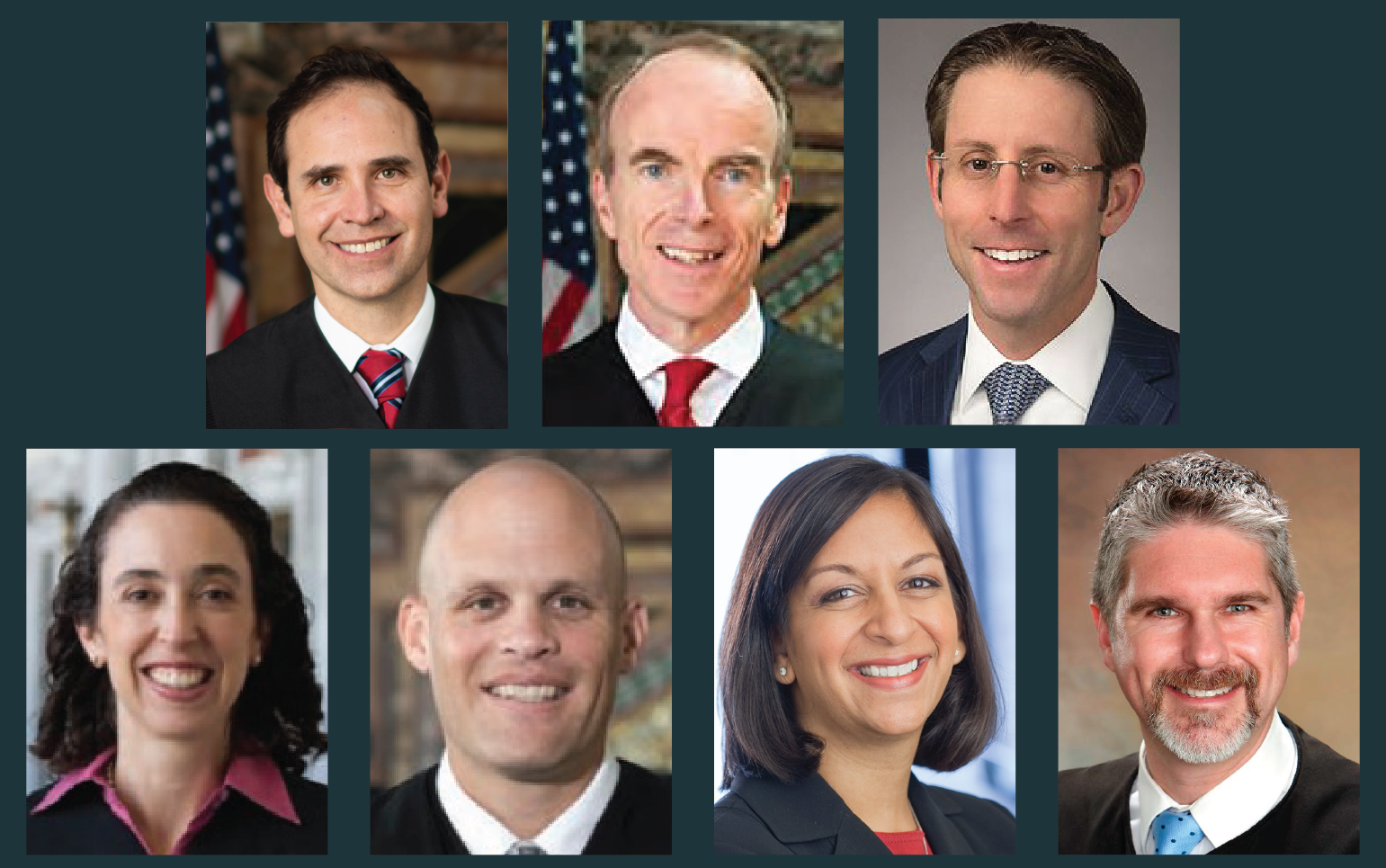 |
On September 21, a proud group of MTO lawyers and alumni had the pleasure of attending the investiture of alumnus Gabe Sanchez as a member of the Ninth Circuit Court of Appeals. Sitting among the en banc judges also in attendance were four other MTO alumni, Judge Dan Collins, Judge Dan Bress, Judge Michelle Friedland and Judge John Owens, constituting a record-breaking fivesome of MTO alums on the appellate court.
The ceremony could not have been more moving. Judge Sanchez’s three young nieces led the Pledge of Allegiance in the packed ceremonial courtroom; his 11-year-old son played two beautiful violin pieces; and his wife, Christina, spoke to the courage her husband has shown throughout his career. In addition to video messages from former Gov. Jerry Brown and Sen. Alex Padilla, speakers included a former state court judicial colleague, a high school friend who is now a law firm partner, and another distinguished MTO alumnus, Jeff Bleich. Both Jeff and Judge Sanchez recalled the pro bono matters they worked on together, and Jeff noted how quickly it became clear that Judge Sanchez’s passion was for public service.
Chief Judge Mary Murguia, who presided, and several speakers talked about how important MTO was to Judge Sanchez’s professional development.
Most touching was the presence of Judge Sanchez’s mother, a single mom who emigrated from Mexico. She radiated pride throughout the proceeding, including when Chief Judge Murguia ended the ceremony with several words spoken directly to her in Spanish: “Que orgullo para usted!” (“What pride for you!”)
In the days before the ceremony, we had the chance to catch up with Judges Bress, Friedland and Owens as well as with our other current federal judge alumni, Judge Sarala Nagala (D. Conn.) and Judge Dan Calabretta (formerly Powell) (E.D. Cal.). We asked the judges about their time at MTO, whether and how it prepared them for their current positions, and how their professional lives differed from firm life. Their reflections had common threads, but each brought unique insights to the question.
Judge Friedland found that, to her surprise, the transition was not that difficult since she did so much research, writing and thinking on a day-to-day basis at MTO. In fact, the biggest change for her was having to manage chambers — like “running a small law firm,” as she put it — with the decisions and supervision that entails. That said, supervising and teaching her law clerks is one of her favorite parts of the job, as well as having to deal with a broader array of topics, industries and legal areas than she faced at MTO.
Judge Bress told us that he learned from MTO that the law requires concentrated time and effort, and the writing and thinking skills he developed at the firm have stood him in good stead at the court. He also emphasized that he learned at MTO how important it is to be a good colleague and that, while judges must reach their own conclusions, it is very important to develop strong relationships with fellow members of the court. He values in particular his close friendships with his fellow MTO alumni who “share that MTO DNA.”
Judge Owens found that the hardest part of the transition was giving up the “team camaraderie” aspect of MTO firm life. He recalls enjoying working with new MTO associates, something very similar to his relationship with his law clerks, but he noted that ultimately judges need to make their own call; he looks back fondly on the “tough and often hilarious” times working and reaching strategic decisions with his MTO colleagues. On the other hand, he added with a chuckle, he does not miss billing time, worrying about conflict issues, and stressing over client demands and time pressure; the pace of judging at the appellate level is just slower, he notes.
Judge Nagala has found that, while her years as an AUSA prepared her well for her criminal docket, her time at MTO prepared her for the far more substantial civil docket of a federal judge. She learned what it means to litigate at the highest level, to prioritize ethics and “to dig in on the theory of a case.” She often recalls MTO lessons — for example, the value of writing clearly learned from MTO alumnus Kristin Linsley and the importance of clear witness statements from another alum (and now state court judge), Greg Weingart.
Judge Calabretta also noted that his job at MTO was making recommendations to clients, whereas he now has no client and is instead the ultimate decision-maker. He said that in his new position, he needs to figure out how best to use his limited time to get to the right result as efficiently as possible, separating out the easier cases whose outcome is more obvious from those in which a “deep dive” into the facts and law is necessary.
We also asked Judge Calabretta about the significance of being one of the few LGBTQ federal judges in the country, and the first in the Eastern District of California. He noted that he considered it an important milestone, as President Biden said in nominating him, but that it did not define who he is as a judge. He said he hopes it sends a message that there is not only one type of person who can become a federal judge, not only one path, but rather there are “many different molds.”
Last, we asked the judges how they found the role of judge in such wrought and difficult times for our society generally. Judge Nagala said she recognizes the importance of trust in the judicial system, and she finds herself going the extra step to explain her decisions as fully as possible to make clear her reasoning and avoid any claim of bias. Judge Friedland emphasized how much she values trying to reach consensus with judges of different backgrounds and perspectives, finding common ground where possible and explaining differences respectfully and collegially when it is not possible. Likewise, Judge Bress spoke of the importance of relationships, respect and friendship among judges, even where opinions diverge. And Judge Owens, renowned for his plainspokenness and pop culture references in his decisions, underlined the importance of remaining true to one’s own voice. He finds that authenticity is critical to ensuring impartiality and to making sure that all litigants who appear before the court feel that they have gotten a fair shake.
Speaking with our judicial alumni, one is struck by their honesty, openness and kinship. Everyone at MTO and all the rest of our alumni take the greatest pride in our fellow Munger veterans on the federal bench.
MTO Alumni CLE Series
The MTO Alumni Network is excited to announce the launch of our highly anticipated Alumni CLE Series! Starting in January, we will offer a series of informative sessions that delve into various legal subjects. Our goal is to provide valuable knowledge and insights to help fulfill your educational needs.
The sessions will be conducted online, allowing you to conveniently join from anywhere with an internet connection. Stay tuned for the exact schedule and registration details, which will be released soon.
Alumnus Speaker Lunch Series
MTO is continuing our Alumnus Speaker Lunch series! This series features alums who share their inspiring stories, insights and MTO history with our community. All alumni are welcome to join the lunch talks remotely.
Mindy LeMoine, the director of litigation at Netflix, was our September Alumni Speaker. Mindy spoke about her work on cutting-edge legal issues at Netflix and her experience as a young associate trying to get Mike Doyen to review her first set of discovery responses.
Mindy followed a series of MTO alums, including Marty Willhite of Tulco (who kicked off the series in January); Sarah Boyce of the North Carolina Department of Justice; David Dinielli of the Southern Poverty Law Center; Rep. Ted Lieu; and John Frank of Oaktree.
David Ryan, U.S. Attorney’s Office (C.D. Cal.), spoke on October 12. Upcoming speakers are Derek Kaufman of TMZ on November 30 and Adam Gottesfeld of TikTok on December 14.
Case Spotlights
Munger, Tolles & Olson Represents Hawaiian Electric CEO in Congressional Testimony
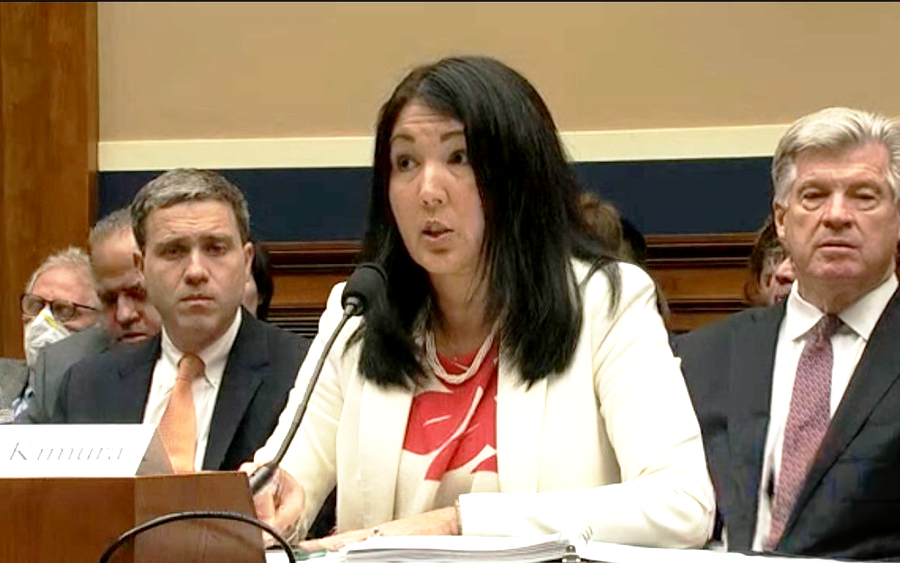 |
An MTO team led by Brad Brian, Henry Weissmann and Nick Fram is representing Hawaiian Electric Company related to the Maui wildfires. In addition to handling litigation and regulatory issues, Brad and Nick represented the CEO, Shelee Kimura, in her testimony before Congress on September 28.
MTO Achieves Victory for Chevron in Antitrust Suit over Oil Production via Foreign Affairs Doctrine
 |
MTO lawyers are handling D’Augusta et al. v. American Petroleum Institute et al. for Chevron in the Northern District of California. The plaintiffs allege that in late March and early April 2020, at the request of a number of domestic oil companies (who are defendants in the litigation), then-President Donald Trump brokered an agreement between Saudi Arabia and Russia to reduce their oil production in order to stabilize world oil markets. Plaintiffs claim this alleged agreement violated U.S. antitrust laws.
Drawing on their expertise in antitrust and foreign affairs law, our lawyers led the joint defense group in successfully moving to dismiss the complaint with prejudice. The district court found that adjudicating plaintiffs’ claims would improperly undermine the political branches’ exercise of their foreign affairs powers, would encroach on the sovereignty of Saudi Arabia and Russia, and would unconstitutionally punish the domestic oil companies for exercising their First Amendment rights to petition the government. The district court also found that plaintiffs had simply failed to plausibly allege any unlawful conspiracy. MTO now leads the charge in defending that result before the Ninth Circuit.
The MTO team handling the case includes Glenn Pomerantz, Kyle Mach, Ginger Anders, Stephany Reaves and Helen White.
Munger, Tolles & Olson Represents City of Los Angeles in Qui Tam Action
 |
In April 2023, the City of Los Angeles engaged MTO as its new lead outside counsel in a major qui tam False Claims Act suit, United States ex rel. Mei Ling, et al. v. City of Los Angeles, in which the United States has intervened as plaintiff. The firm is defending Los Angeles against allegations that the City falsely claimed compliance with federal disability accessibility standards when drawing upon federal affordable housing grants. Notwithstanding the City’s 2019 groundbreaking settlement with the U.S. Department of Housing and Urban Development, under which the City is providing landmark accessibility improvements across its housing program, the U.S. Department of Justice continues to pursue a potentially multibillion-dollar judgment. The firm is working closely with newly elected City Attorney Hydee Feldstein Soto to defeat these claims, which have the potential to severely limit the City’s ability to assist Angelenos in need.
Daniel Levin is leading the firm’s team, which includes Blanca Young, Hailyn Chen, Craig Lavoie, James Salzmann, Cory Batza, Jimmy Biblarz and Sidney Moskowitz.
Deal Spotlight: Everything’s Coming Up Roses…and Awards
The MTO corporate and tax group has been busy closing deals — and busy being recognized for its efforts!
2023 Dealmakers of the Year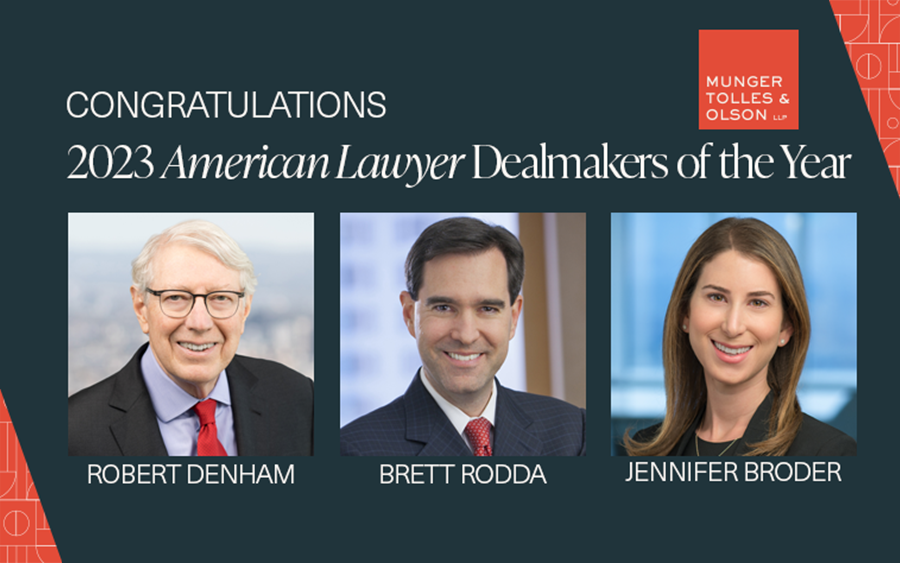
In April, The American Lawyer named Bob Denham, Brett Rodda and Jennifer Broder 2023 Dealmakers of the Year for their representation of Berkshire Hathaway in its $11.6 billion acquisition of Alleghany Corp. The deal was particularly notable given the speed in which it was negotiated — the core of the transaction was worked out in a single week.
Smelling the Roses
 |
It’s been a challenging 2023 deal market, given increased funding costs and lingering concerns about general economic conditions. In response to these challenges, the MTO team has worked alongside its private equity clients to explore creative ways to structure transactions, strengthen company performance and find value. We recently helped the iconic Mercury Man–logoed FTD combine with From You Flowers, a leading floral ecommerce company. The deal was structured as a combination to scale each company’s individual strengths and create a strong global platform in the floral and gifting industry. The combined enterprise will take advantage of FYF’s strong consumer ecommerce platform and FTD’s extensive florist network to better serve customers across the From You Flowers, Proflowers and FTD brands.
And There’s More . . .
Read about other recent MTO news and accolades.
